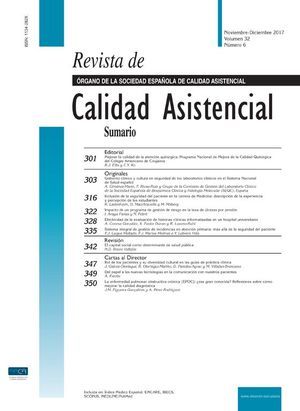La diabetes es una enfermedad crónica con un alto impacto tanto en la salud como en la calidad de vida relacionada con la salud (CVRS). El objetivo de este estudio fue evaluar la satisfacción del tratamiento en pacientes con diabetes mellitus tipo 2 a través del Cuestionario de satisfacción con el tratamiento de la diabetes (DTSQ) y su relación con variables sociodemográficas, con medicación antidiabética y variables clínico-analíticas.
Materiales y métodosSe diseñó un estudio transversal que se realizó en el Hospital General Universitario de San Juan de Alicante entre septiembre de 2016 y diciembre de 2017. Se incluyeron 232 pacientes diagnosticados con diabetes mellitus tipo 2 al menos un año antes de la inclusión, tratados con medicación antidiabética. Se utilizó la versión en español de la escala DTSQ para medir la satisfacción del tratamiento recibido. Se analizaron los factores asociados a la baja satisfacción aplicando test Chi-cuadrado para las variables cualitativas y T de Student para cuantitativas. Para estimar magnitudes de asociación se ajustaron modelos logísticos multivariantes.
ResultadosEl 21,5% de los pacientes presentaron baja satisfacción con el tratamiento. Los pacientes que presentaron baja satisfacción al tratamiento se asociaron a medicamentos que podían generar hipoglucemia (OR: 2,872 [1,195-6,903]), a niveles de HbA1c superiores al 7% (OR: 2,260 [1,005-5,083]) y a fármacos administrados por vía oral (OR: 2,749 [1,233-6,131]).
ConclusionesLa satisfacción que percibe el paciente con el tratamiento, medida con el cuestionario DTSQ, fue menor en aquellos pacientes que tomaban medicamentos que producían hipoglucemia, aquellos que presentaban niveles de HbA1c superiores al 7%, y aquellos que tomaban medicación oral.
Diabetes is a chronic disease with a high impact on both health and Quality of Life Related to Health (QLRH). To evaluate the satisfaction of treatment in patients with type 2 diabetes mellitus through the Diabetes Treatment Satisfaction Questionnaire (DTSQ) and its relationship with sociodemographic variables, with antidiabetic medication and clinical-analytical variables.
Materials and methodsThis cross-sectional study was conducted in General University Hospital of San Juan de Alicante between September 2016 and December 2017. Two hundred thirty-two patients diagnosed with type 2 diabetes mellitus at least 1 year before inclusion, treated with antidiabetic medication were included. The Spanish version of the DTSQ scale was used to measure satisfaction with treatment. Factors associated with low satisfaction were analyzed by applying the Chi-square test for qualitative variables and Student-T for quantitative variables. To estimate magnitudes of association, logistic models were adjusted.
ResultsTwo hundred thirty-two patients were included in this study. 21.5% of the patients presented low satisfaction with the treatment. Patients who presented low satisfaction with treatment were associated with medications that could cause hypoglycemia (OR: 2.872 [1.195–6.903]), HbA1c levels higher than 7% (OR: 2.260 [1.005–5.083]) and drugs administered by the route oral (OR: 2.749 [1.233–6.131]).
ConclusionsPatients with type 2 diabetes mellitus who had a lower score on the DTSQ questionnaire were associated with medications that produced hypoglycaemia, and with higher levels of HbA1c higher than 7%, and those who took oral medication.
Artículo
Comprando el artículo el PDF del mismo podrá ser descargado
Precio 19,34 €
Comprar ahora







